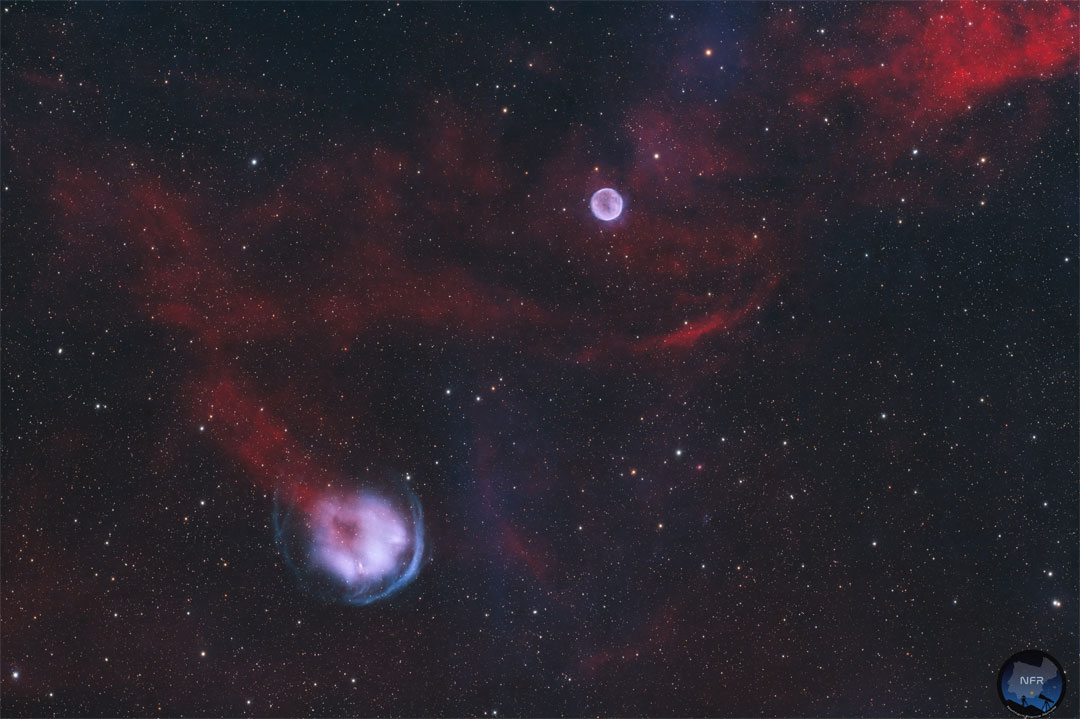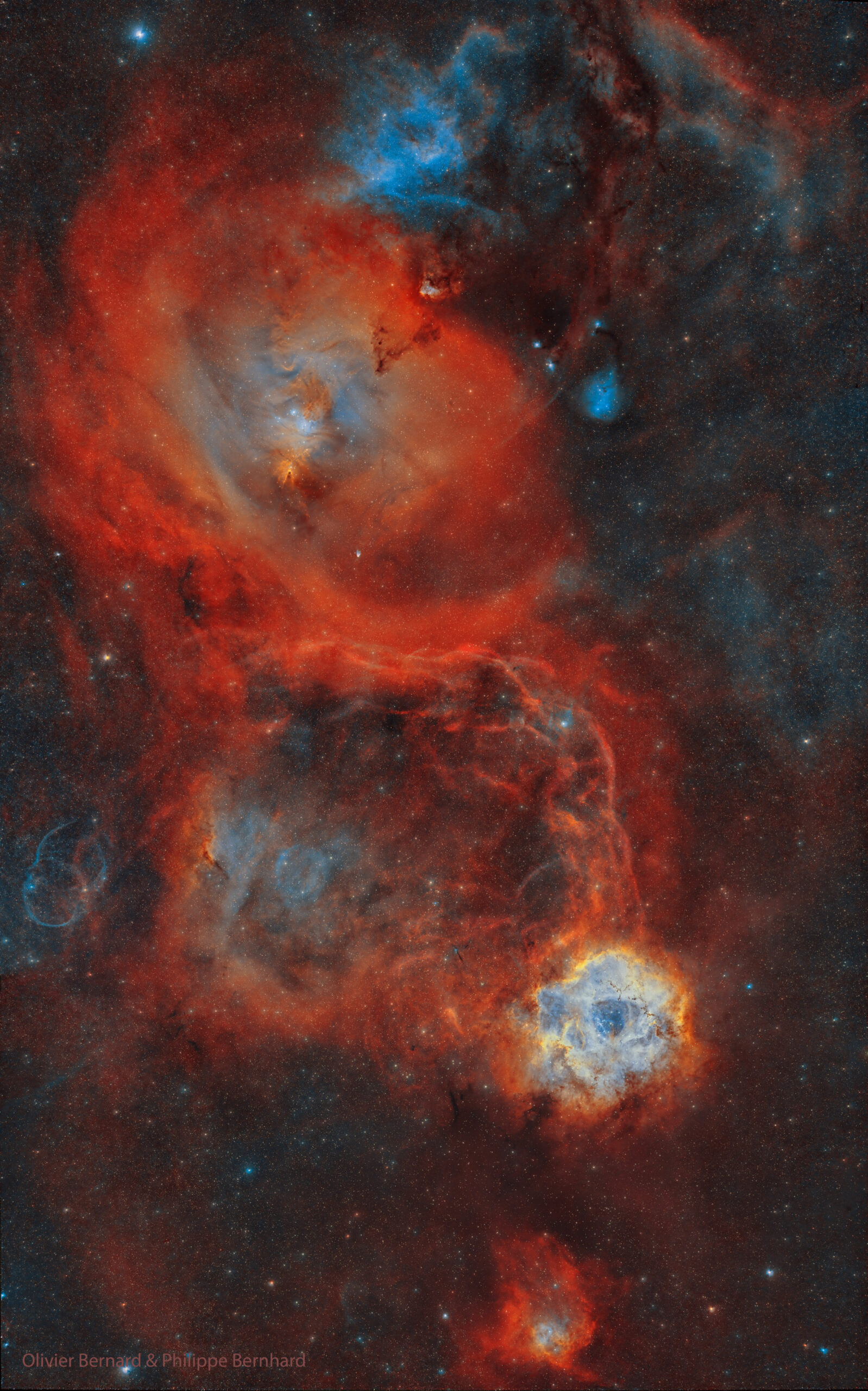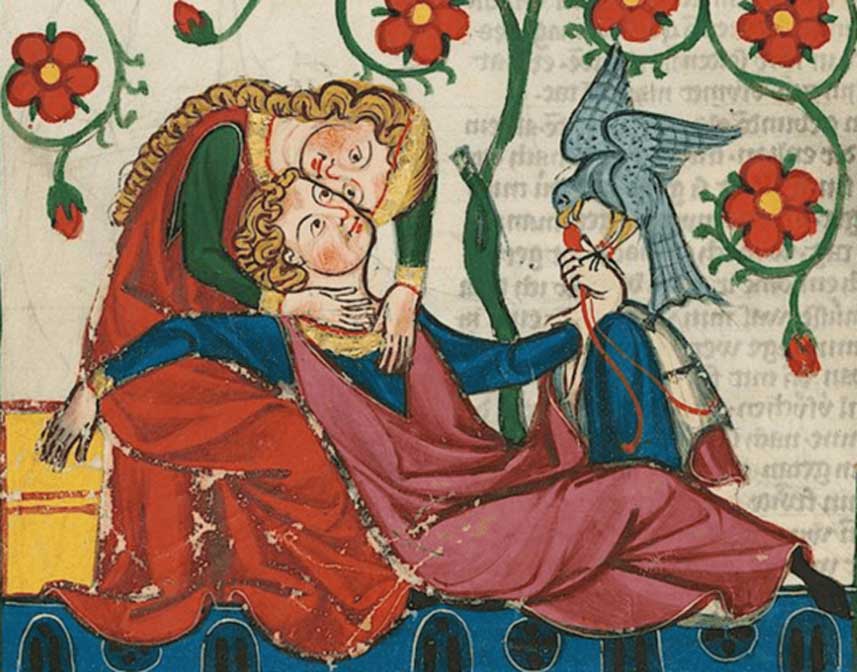Blog
Planetary nebulae like Heckathorn-Fesen-Gull 1 (HFG1) and Abell 6 in the constellation Cassiopeia are remnants from the last phase of a medium sized star like our Sun. In spite of their shapes, planetary nebulae have nothing in common with actual planets. Located in the bottom left part of the featured photo, HFG1 was created by the binary star system V664 Cas, which consists of a white dwarf star and a red giant star. Both stars orbit their center of mass over about half an Earth day. Traveling with the entire nebula at a speed about 300 times faster than the fastest train on Earth, V664 Cas generates a bluish arc shaped shock wave. The wave interacts most strongly with the surrounding interstellar medium in the areas where the arc is brightest. After roughly 10,000 years, planetary nebulae become invisible due to a lack of ultraviolet light being emitted by the stars that create them. Displaying beautiful shapes and structures, planetary nebulae are highly desired objects for astrophotographers.

William Henry Deppenschmidt (February 16, 1936 – March 20, 2021) was an American jazz drummer.
Deppenschmidt’s father, a saxophone player, led an orchestra under the name Buddy Williams after playing with and arranging for Paul Whiteman, Jimmy and Tommy Dorsey, and Glenn Miller. When he was four, Deppenschmidt and his mother moved from Philadelphia to Richmond, Virginia.
Self-taught, he started playing drums professionally while in his teens and then went on the road with Ronnie Bartley’s Orchestra, a territory band which travelled in the western U.S. Returning to Richmond, he played with local bands and became the drummer for the Newton Thomas Trio (1954–59) which was also the rhythm section for the Billy Butterfield Quintet. The trio toured with Butterfield throughout the northeast and midwest (1958–59).[3] When the Newton Thomas Trio played the Virginia Beach Jazz Festival, it received rave reviews on a bill that included the Dave Brubeck Quartet and the Charlie Byrd Trio. Two nights later, Charlie Byrd came into the Jolly Roger, the jazz club where Deppenschmidt was playing, and offered him the job as drummer with his trio. He played with the trio at the Showboat Lounge in Washington, D.C. from 1959 to 1962.
Starting in February 1961, the Charlie Byrd Trio (Charlie Byrd, guitar, Keter Betts, bass, and Buddy Deppenschmidt, drums) visited South America, Central America, and Mexico on a goodwill tour sponsored by the U.S. State Department. This three-month cultural exchange included eighteen countries. While in Brazil, Deppenschmidt spent his free time with local musicians, teaching them American jazz and learning bossa nova from them. It was his idea to record an album combining jazz and bossa nova with Stan Getz.
more...William Ballard Doggett (February 16, 1916 – November 13, 1996) was an American pianist and organist. He began his career playing swing music before transitioning into rhythm and blues. Best known for his instrumental compositions “Honky Tonk” and “Hippy Dippy”, Doggett was a pioneer of rock and roll. He worked with the Ink Spots, Johnny Otis, Wynonie Harris, Ella Fitzgerald, and Louis Jordan.
Doggett was born in Philadelphia. During the 1930s and early 1940s he worked for Lucky Millinder, Frank Fairfax and arranger Jimmy Mundy. In 1942 he was hired as the Ink Spots‘ pianist and arranger.
more...Giuseppe “Joe” Venuti (September 16, 1903 – August 14, 1978) was an American jazz musician and pioneer jazz violinist.
Considered the father of jazz violin, he pioneered the use of string instruments in jazz along with the guitarist Eddie Lang, a friend since childhood. Through the 1920s and early 1930s, Venuti and Lang made many recordings as leader and as featured soloists. He and Lang became so well known for their ‘hot’ violin and guitar solos that on many commercial dance recordings they were hired to do 12- or 24-bar duos towards the end of otherwise stock dance arrangements. In 1926, Venuti and Lang started recording for the OKeh label as a duet (after a solitary duet issued on Columbia), followed by “Blue Four” combinations, which are considered milestone jazz recordings. Venuti also recorded commercial dance records for OKeh under the name “New Yorkers”.
He worked with Benny Goodman, Adrian Rollini, the Dorsey Brothers, Bing Crosby, Bix Beiderbecke, Jack Teagarden, Frank Signorelli, the Boswell Sisters, and most of the other important white jazz and semi-jazz figures of the late 1920s and early 1930s. However, following Lang’s death in 1933, Venuti’s career began to wane, though he continued performing through the 1930s, recording a series of commercial dance records (usually containing a Venuti violin solo) for the dime store labels, as well as OKeh and Columbia, plus the occasional jazz small group sessions. He was also a strong early influence on western swing players like Cecil Brower. Many of the 1920s OKeh sides continued to sell and remained in print through 1935 when ARC discontinued the OKeh label and reissued selected sides on the 35-cent Vocalion label (the OKeh label was revived by CBS in 1940).
After a period of relative obscurity in the 1940s and 1950s, Venuti played violin and other instruments with Jack Statham at the Desert Inn Hotel in Las Vegas. Statham headed several musical groups that played at the Desert Inn from late 1961 until 1965, including a Dixieland combo. Venuti was with him during that time, and was active with the Las Vegas Symphony Orchestra during the 1960s. He was ‘rediscovered’ in the late 1960s. In the 1970s, he established a musical relationship with tenor saxophonist Zoot Sims resulting in three recordings. In 1976, he recorded an album of duets with pianist Earl Hinesentitled Hot Sonatas. He also recorded an entire album with country-jazz musicians including mandolinist Jethro Burns (of Homer & Jethro), pedal steel guitarist Curly Chalker and former Bob Wills sideman and guitarist Eldon Shamblin. Venuti died in Seattle, Washington.
more...FANDANGO: For dance it is always fandango de huelva. There are two main types of melodies used for dance, with a final remate they call “por bulerias” but it never felt like buleria to me.
After you figure out how you will structure any falseta or estribillo (chorus that might repeat or go between coplas) and number of basic compases (4 measures usually is one compas) then you have these types of coplas (using the basic compasing for chord you say you know well already)
G7-C (depending on the melody, the C chord change comes right on the 3rd beat of the first measure, or on the 3rd beat of the 3rd measure)
So either beats 1-6, or you have just G7 for beats 1-6, then G7-C for the next 7-12 beats.
The rest is always the same.
C-C (1-6) C7-F (7-12)
F-G7 (1-6) G7-C (7-12)
C-C, C(orD7 passing)-G7
G7-G7, G7-C
C7-F, F-E
So you see the copla is always 6 compases long (or 5 1/2 if you do that short version in the beginning…depends on the melody and it is obvious). If you opt to play copla type falseta (such as the ones PDL does in his guitar solos), be aware they often have an extra 2 compas tag to square things off, so you need to cut those so it is clear 6 compases. And only do the 1/2 compas thing if there is a singer.
The other type of melody is the exact same length, but you go to A major instead of C major:
E7-E7, E7-Amajor
Am (minor)-Am, Am-E7
E7-E7, E7-A (major)
Am-Am, Am-E7
E7-E7, E7-A
Am-F, F-E
Shiny NGC 253 is one of the brightest spiral galaxies visible, and also one of the dustiest. Some call it the Silver Coin Galaxy for its appearance in small telescopes, or just the Sculptor Galaxy for its location within the boundaries of the southern constellation Sculptor. Discovered in 1783 by mathematician and astronomer Caroline Herschel, the dusty island universe lies a mere 10 million light-years away. About 70 thousand light-years across, NGC 253 is the largest member of the Sculptor Group of Galaxies, the nearest to our own Local Group of Galaxies. In addition to its spiral dust lanes, tendrils of dust seem to be rising from its galactic disk laced with young star clusters and star forming regions in this colorful galaxy portrait. The high dust content accompanies frantic star formation, earning NGC 253 the designation of a starburst galaxy. NGC 253 is also known to be a strong source of high-energy x-raysand gamma rays, likely due to massive black holes near the galaxy’s center.

Alistair Ian Campbell (born 15 February 1959) is an English singer and songwriter who was lead singer and co-founder of the British reggae band UB40.
UB40 sold more than 100 million records worldwide and toured for 30 years with the original lineup of the band. In 2008, Campbell left UB40 due to a dispute with band management, alongside Mickey Virtue (Keyboard) also left for the same reasons and teamed up with Ali in the new band.
In August 2014, Campbell announced he had reunited with former UB40 bandmate Astro who also left due to management disputes and the musical direction of the band. Campbell then formed UB40 Featuring Ali, Astro & Mickey.
more...
Henry Threadgill (born February 15, 1944) is an American composer, saxophonist and flautist. He came to prominence in the 1970s leading ensembles rooted in jazz but with unusual instrumentation and often incorporating other genres of music. He has performed and recorded with several ensembles: Air, Aggregation Orb, Make a Move, the seven-piece Henry Threadgill Sextett, the twenty-piece Society Situation Dance Band, Very Very Circus, X-75, and Zooid.
He was awarded the 2016 Pulitzer Prize for Music for his album In for a Penny, In for a Pound, which premiered at Roulette Intermedium on December 4, 2014.
In 2023, he published his autobiography, written with Brent Hayes Edwards: Easily Slip into Another World: A Life in Music.
Threadgill performed as a percussionist in his high-school marching band before taking up baritone saxophone, alto saxophone, and flute. He studied at the American Conservatory of Music in Chicago, majoring in piano, flute, and composition. He studied piano with Gail Quillman and composition with Stella Roberts. He was an original member of the Experimental Band, a precursor to the Association for the Advancement of Creative Musicians (AACM) in his hometown of Chicago, and worked under the guidance of Muhal Richard Abrams, before leaving to tour with a gospel band. In 1967, he enlisted in the U.S. Army, playing with a rock band in Vietnam during the Vietnam War in 1967 and 1968. He was discharged in 1969.
more...Harold Arlen (born Hyman Arluck; February 15, 1905 – April 23, 1986) was an American composer of popular music, who composed over 500 songs, a number of which have become known worldwide. In addition to composing the songs for the 1939 film The Wizard of Oz (lyrics by Yip Harburg), including “Over the Rainbow“, which won him the Oscar for Best Original Song, he was nominated as composer for 8 other Oscar awards. Arlen is a highly regarded contributor to the Great American Songbook. “Over the Rainbow” was voted the 20th century’s No. 1 song by the RIAA and the NEA.
Arlen was born in Buffalo, New York, the child of a Jewish cantor. His twin brother died the next day. He learned to play the piano as a youth, and formed a band as a young man. He achieved some local success as a pianist and singer before moving to New York City in his early twenties, where he worked as an accompanist in vaudeville and changed his name to Harold Arlen. Between 1926 and about 1934, Arlen appeared occasionally as a band vocalist on records by The Buffalodians, Red Nichols, Joe Venuti, Leo Reisman, and Eddie Duchin, usually singing his own compositions.
In 1929, Arlen composed his first well-known song: “Get Happy” (with lyrics by Ted Koehler). Throughout the early and mid-1930s, Arlen and Koehler wrote shows for the Cotton Club, a popular Harlem night club, as well as for Broadway musicals and Hollywood films. Arlen and Koehler’s partnership resulted in a number of hit songs, including the familiar standards “Let’s Fall in Love” and “Stormy Weather“. Arlen continued to perform as a pianist and vocalist with some success, most notably on records with Leo Reisman‘s society dance orchestra.
more...James “Kokomo” Arnold (February 15, 1896 or 1901 – November 8, 1968) was an American bluesmusician. A left-handed slide guitarist, his intense style of playing and rapid-fire vocal delivery set him apart from his contemporaries. He got his nickname in 1934 after releasing “Old Original Kokomo Blues” for Decca Records, a cover version of Scrapper Blackwell‘s blues song about the city of Kokomo, Indiana.
Arnold was born in Lovejoy’s Station, Georgia. Most sources give the date his birth as 1901, but the researchers Bob Eagle and Eric LeBlanc give the date as 1896, on the basis of information in the 1900 census. He learned the basics of playing the guitar from his cousin, John Wiggs.
more...The large, red, and flowery-looking nebula on the upper left may seem the obvious choice, but that is actually just diffuse hydrogen emission surrounding the Cone and Fox Fur Nebulas. The famous Rosette Nebula is really located on the lower right and connected to the other nebulas by irregular filaments. Because the featured image of Rosetta’s field is so wide and deep, it seems to contain other flowers. Designated NGC 2237, the center of the Rosette nebula is populated by the bright blue stars of open cluster NGC 2244, whose winds and energetic light are evacuating the nebula’s center. The Rosette Nebula is about 5,000 light years distant and, just by itself, spans about three times the diameter of a full moon. This flowery field can be found toward the constellation of the Unicorn (Monoceros).
Timothy Charles Buckley III (February 14, 1947 – June 29, 1975) was an American musician. He began his career based in folk rock, but subsequently experimented with genres such as psychedelia, jazz, the avant-garde, and funk as well as unconventional vocal stylings. His commercial peak came with the 1969 album Happy Sad, reaching No. 81 on the charts, while his experimental 1970 album Starsailor went on to become a cult favorite. The latter contained his best known song, “Song to the Siren.” Buckley died at the age of 28 from a heroin and morphineoverdose, leaving behind sons Taylor and Jeff.
Tim Buckley was born in Washington, D.C., on Valentine’s Day, February 14, 1947, to Elaine (née Scalia), an Italian American, and Timothy Charles Buckley Jr., a decorated World War II veteran and son of Irish immigrants from Cork. He spent his early childhood in Amsterdam, New York, an industrial city about 40 miles (64 km) northwest of Albany. At five years old, Buckley began listening to his mother’s progressive jazz recordings, particularly Miles Davis.
more...Merl Saunders (February 14, 1934 – October 24, 2008) was an American multi-genre musician who played piano and keyboards, favoring the Hammond B-3 console organ.
Born in San Mateo, California, United States, Saunders attended Polytechnic High School in San Francisco. In his first band in high school was singer Johnny Mathis. He served in the U.S. Air Force from 1953 to 1957. He worked as musical director of the Billy Williams Revue and served in a similar capacity in Oscar Brown Jr.‘s off-Broadway show, Big Time Buck White.
He gained notice in the 1970s when he began collaborating with Jerry Garcia, with whom he had begun playing in 1971 at a small Fillmore Street nightclub called The Matrix. He sat in with the Grateful Dead, and co-founded the Saunders/Garcia Band which produced three albums, and which became the Legion of Mary, with the addition of Martin Fierro (sax) in 1974. It disbanded the following year, but he and Garcia continued to collaborate in the band Reconstruction during 1979, collaborating with Ed Neumeister(trombone), Gaylord Birch (drums) and John Kahn (bass).
more...amuel Gene Maghett (February 14, 1937 – December 1, 1969), known as Magic Sam, was an American Chicago blues musician. He was born in Grenada County, Mississippi, and learned to play the blues from listening to records by Muddy Waters and Little Walter. After moving to Chicago at the age of 19, he was signed by Cobra Records and became well known as a bluesman after the release of his first record, “All Your Love”, in 1957. He was known for his distinctive tremolo guitar playing.
The stage name Magic Sam was devised by Sam’s bass player and childhood friend Mack Thompson at Sam’s first recording session for Cobra, as an approximation of “Maghett Sam”. The name Sam was using at the time, Good Rocking Sam, was already being used by another artist. His career was cut short when he suddenly died of a heart attack in December 1969. He was 32 years old. Magic Sam was buried in the Restvale Cemetery, in Alsip, Illinois.
more...More Posts
- Julian Priester Day
- World Music with Paco De Lucia
- Daily Roots with Alton Ellis & the Heptones
- The Cosmos with Sharpless 2-106
- John Medeski Day
- David Honeyboy Edwards Day
- World Music with Odpoczno
- Daily Roots with Ras Tweed
- The Cosmos with M8
- Johnny “Big Moose” Walker Day
- Elmo Hope Day
- Shad Collins Day
- World Music with Eleftheria Arvanitaki
- Daily Roots with Israel Vibration
- The Cosmos with NGC 1187
- Reggie Workman Day
- Big Bill Broonzy Day
- World Music with Very Be Careful
- Daily Roots with Uwe Banton
- The Cosmos with M20
